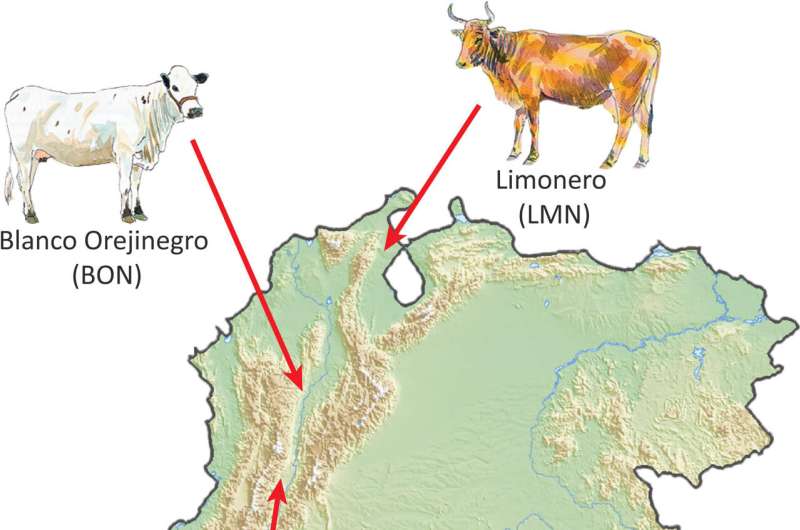This article has been reviewed according to Science X's editorial process and policies. Editors have highlighted the following attributes while ensuring the content's credibility:
fact-checked
peer-reviewed publication
trusted source
proofread
Criollo cattle: Could an old breed be the beef industry's answer to climate change?

As the threat of rising temperatures puts the world's food supplies at risk, new University College Dublin (UCD) research on a rare breed of "heat-resistant" cattle that thrive in warmer climates could point towards a more sustainable beef industry.
Criollo cattle have been in Latin America for hundreds of years, having originally been brought to the New World from Spain on the second voyage of Christopher Columbus in 1493.
Having been undervalued in the past, Criollo cattle breeds could now offer a solution to the challenges posed by climate change due to their unique heat tolerance and disease resistance traits.
A new study published in Royal Society Open Science by UCD researchers involved in an international collaboration with scientists from Brazil, Venezuela, Germany, the UK, and the United States into the microevolutionary changes in Criollo cattle as they adapted to the tropical environments of Latin America provides strong evidence of several distinct coat and skin coloration traits that are advantageous in cattle populations exposed to significant levels of incident solar radiation.
This "slick" phenotype in Criollo cattle results in a short, slick-hair coat that provides improved thermotolerance, allowing them to better withstand hot and humid weather.
Genomic selection signatures were also discovered that may be associated with further thermotolerance, again underscoring the breed's adaptation to hot climates.
Scientific studies have shown that cattle better able to withstand hot weather are less likely to experience temperature-related stress, resulting in improved body weight and more efficient food production, as well as improved animal welfare in warmer climates.
Criollo cattle have already been the focus of commercial gene editing efforts according to lead author Professor David MacHugh, UCD School of Agriculture and Food Science, as US industry collaborators who are co-authors on the study have used gene editing to introduce the 'slick' trait into European cattle.
Climate change brings more than just higher temperatures, warmer weather also means too little precipitation, abrupt temperature swings, increased soil erosion, more wildfires, and generally more pests and more diseases.
Using whole-genome sequencing data, however, the UCD team detected a host of gene signatures associated with a myriad of adaptive traits, revealing genes linked to reproduction, fertility, and disease immunity.
"This study underscores the remarkable adaptability of Criollo cattle and highlights the genetic richness and potential of these breeds in the face of climate change, habitat flux and disease challenges," added Professor MacHugh.
More information: James A. Ward et al, Genomic insights into the population history and adaptive traits of Latin American Criollo cattle, Royal Society Open Science (2024). DOI: 10.1098/rsos.231388
Journal information: Royal Society Open Science
Provided by University College Dublin




















